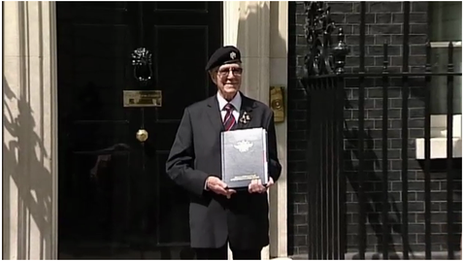Save Welsh Cavalry campaign stage Westminster rally
- Published

Desert Rat Harold Ponfield, 93, delivered the petition to Downing Street.
Campaigners fighting to save 1st The Queen's Dragoon Guards, also known as the Welsh Cavalry, have staged a rally in London.
Desert Rat Harold Ponfield, 93, was amongst former soldiers at Westminster on Thursday as a petition was delivered to Downing Street.
The regiment is believed to be under threat from UK government defence cuts.
One defence economist said regimental loyalties were deep, but some historic army units would inevitably disappear.
The UK government plans to cut the number of British troops from 102,000 to 82,000 by 2020.
In May, former officers and a senior source in one of just three remaining Welsh regiments, told BBC Wales they believed the name could disappear altogether.
Defence officials said no decision on the regiment had yet been taken.
The Welsh Cavalry recently returned from a six-month tour of Afghanistan, staging a homecoming parade in Swansea earlier this month.
They also marched through Cardiff as part of the Queen's Diamond Jubilee celebrations, and a memorial service was held in Llandaff Cathedral honouring two men who died in Helmand Province.
The Savethewelshcavalry.com campaign said it hoped its rally in London on Thursday - attended by retired members of the regiment - influenced decisions to be made by the UK defence secretary.
'Compulsory redundancies'
A Sabre armoured fighting vehicle, similar to ones used by the regiment in Afghanistan, was draped in its banners as it drove from Parliament Square and delivered a petition to Downing Street.
"We want Wales to be taken seriously and to be properly represented in the Union, and fair representation in the armed forces should be a part of that," said a campaign spokesman.
"When the regiment was in Wales last week they received an amazing welcome from the people of Wales during their parades in Swansea and Cardiff.
"Our next step is to take that support to Westminster and to press the message home to the coalition government."
The defence cuts are the latest in a series of army cuts dating back over the past 50 to 60 years to when, under conscription in the 1950s, the British army put its strength at between 8,000-9,000.
"It's a process that has been going on for quite some time," said defence economist Ron P Smith.
"There have been waves of reductions and compulsory redundancies. And as the army has contracted, various [regimental] names have been absorbed."
'Battle is over'
Prof Smith, of Birkbeck College, London, explained regimental loyalty dated back hundreds of years to when they were first raised, and still ran deep.
"Originally, using a named regiment encouraged recruitment," said Prof Smith. "In terms of morale people got a strong attachment to their own particular regiment, its ways, its cap badge, that sort of thing.
"This was instead of being part of some amorphous British Army."
But he added: "As the army gets to a smaller number it gets more difficult to retain the same number of units, and you get big battles over which units are under threat.
"It's a fact of life that some very traditional, historic regiments are going to disappear. That battle is over.
"Which ones survive and which are cut is likely to become a continuing battle."
Paul Rogers, professor of the department of Peace Studies at Bradford University, also underlined the fierce nature of regimental loyalty.
"People say that the army is tribal," he said. "Regiments are self-contained in their outlook. People in them are loyal to each other and clannish.
"There are historical elements to this. When regiments are raised locally, going back hundreds of years, most people in them will have a direct knowledge of each other, their language, their slang and so on.
"This is particularly the case with general infantry regiments."
- Published2 June 2012
- Published1 June 2012
- Published30 May 2012
- Published23 May 2012
- Published16 May 2012